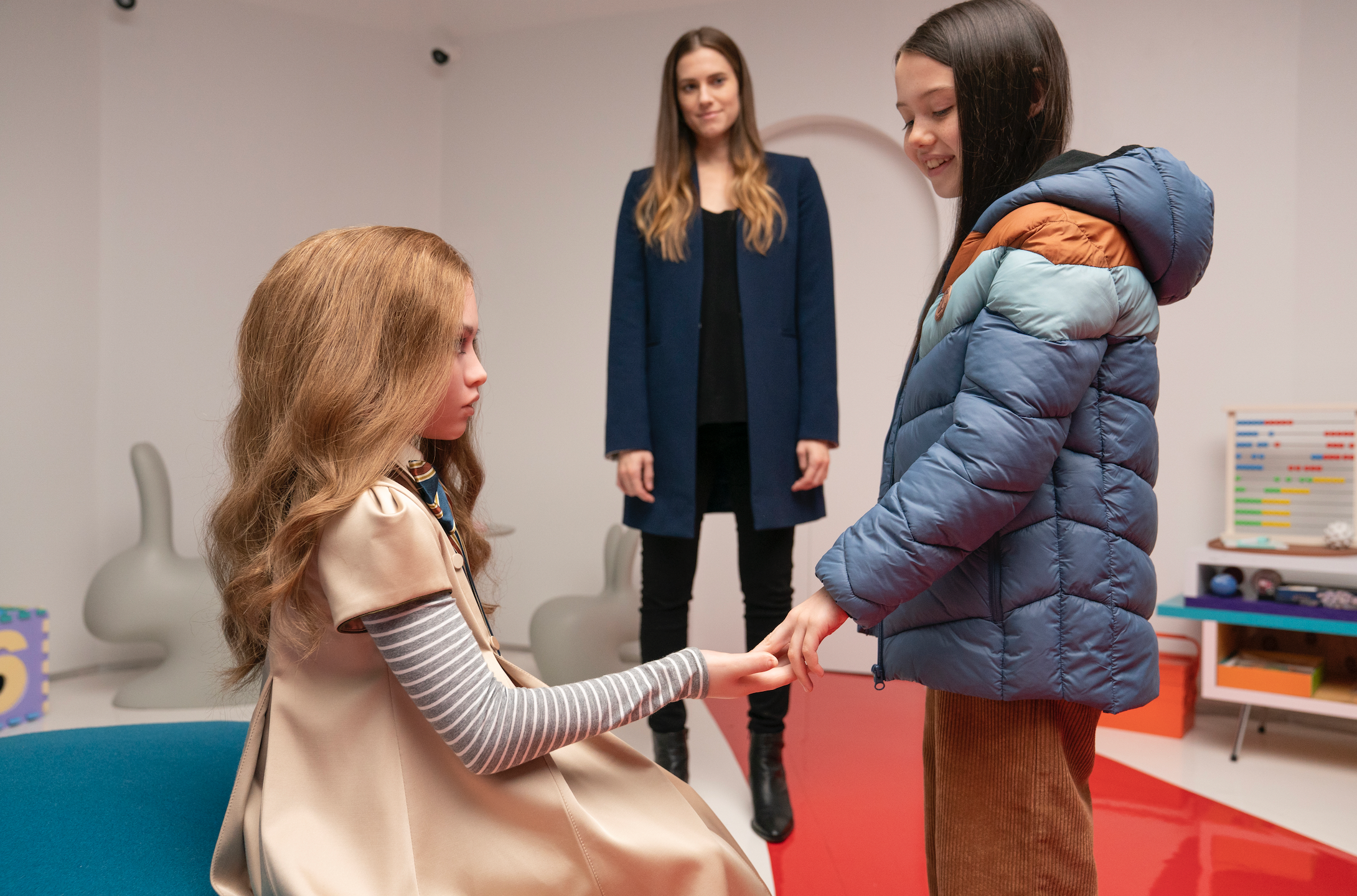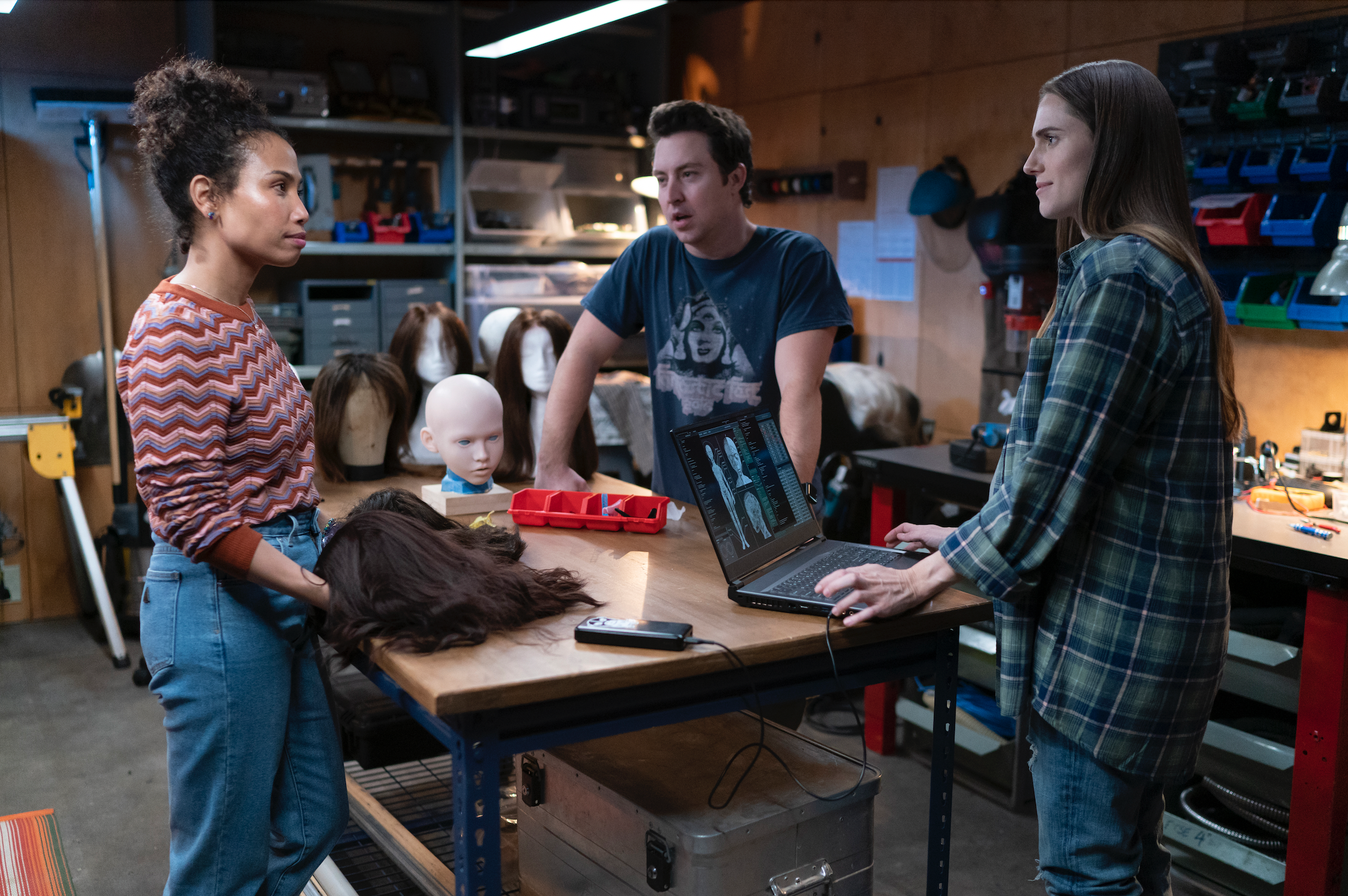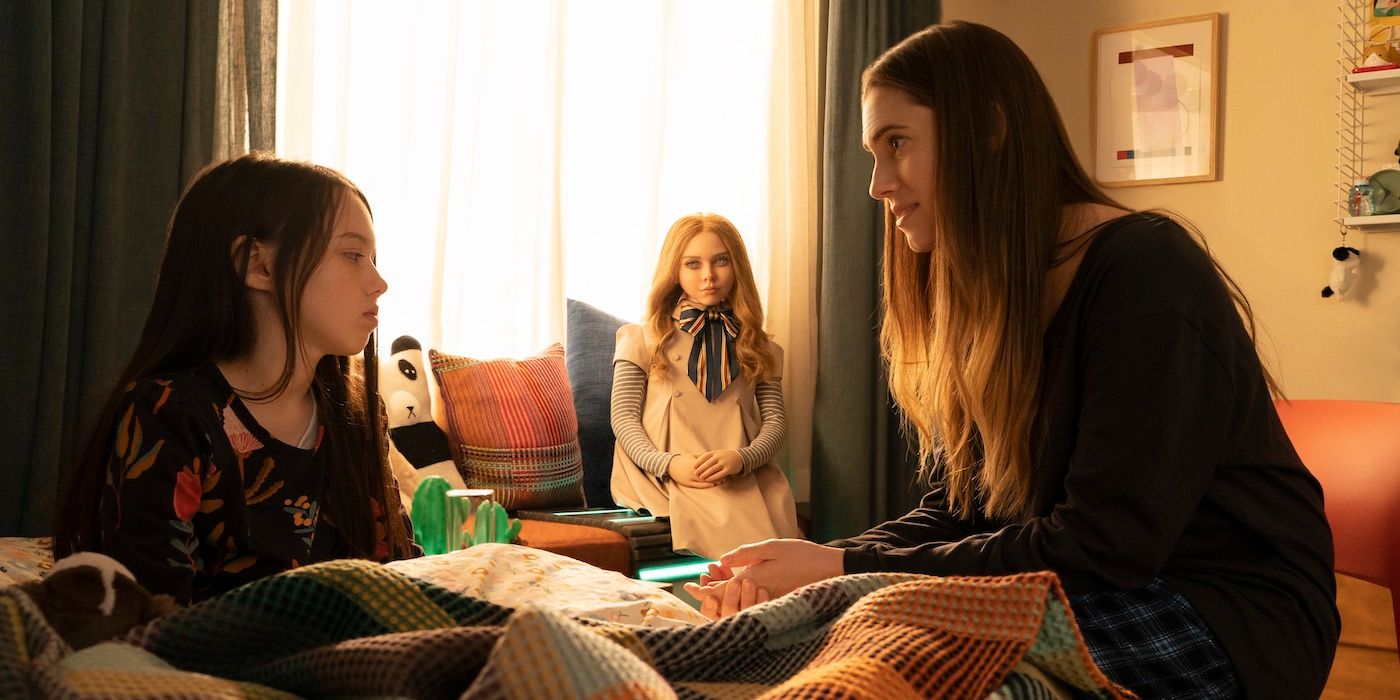As society advances and more and more children grow up surrounded by technology, it’s only natural for filmmakers to draw inspiration from it. It led to the creation of the genre of cyberpunk and the release of numerous films surrounding our interactions with technology and the internet. However, it’s also spawned a trope that’s seen in almost every genre of film now: the “kids these days and their damn devices” trope.
You know the one. It’s the teenage character that’s glued to their phone. The kids sat in front of tablets and video games instead of being outside. The constant, overdone jokes of adults waving their hands in front of a child’s face or acting completely clueless when their kid talks about video games. It’s become a staple in film and TV now. And, like most things that become staples, they become tired fast.
There’s a Solution to Trope Burnout: Look At It Differently
luckily, M3GAN does just that. The latest in a long line of toy turned killer films, M3GAN is ultimately a story about the relationship between toy roboticist Gemma (Allison Williams) and her recently orphaned niece, Cady (Violet McGraw). Not ready to be a guardian for Cady, Gemma finishes developing M3GAN, an android meant to be a companion and stand-in caregiver for kids. Cady quickly grows close to M3GAN and when Gemma tries to intervene, it sends both Cady and M3GAN into a rage. Finally, it comes to a head when M3GAN decides Gemma is entirely unfit to be a mother.
M3GAN is a fascinating film in the way that it deconstructs the “kids and their tech” trope. It’s technically split into two parts: a building of the usual trope and a destruction of it. The movie opens with a fight between Cady’s parents over her screen time. Her mother insists it should be limited to thirty minutes, while her father is more flexible. When she comes to live with Gemma, Cady asks how much screen time she’s allowed, and Gemma tells her as much as she wants. In fact, Gemma even gives Cady what the older generation seems to fear most: a highly advanced piece of tech that takes away the need for the most basic human interactions. The first half of the movie builds the trope slightly to the left, but the point is still there. Kids spend so much time with technology. They love it more than they love the people around them. That’s a bad thing! Look how bad it is!
The Movie Is A Lot More Subtle With How Bad It Is
On one hand, the first half of the film is so bright and shiny, in a way. It’s building M3GAN and marketing her, seeing how useful she is in teaching and guiding Cady, and how she allows caregivers (particularly Gemma) a much-needed break to do everything they need to. We aren’t supposed to see anything wrong here. Even the adults in the movie say it again and again: they don’t care what technology they push to kids, because kids are addicted. It’s placing emphasis on the children as the burden M3GAN bears in their parents’ absence. She makes life easier, and every kid will want her because she’s an extremely advanced piece of technology nothing else could compare to. In this way, M3GAN is telling the tired trope as it always is. The kids are to blame, and it’s that damn phone that’s causing the collapse of the youth.
However, then there is a pretty pivotal scene. Cady’s therapist warns Gemma that Cady is getting too attached to M3GAN due to a lack of parental presence. The tone of the movie begins to shift. It’s no longer a silly, funny-scary story. This second half is where we see the trope deconstructed. Cady begins to act out against Gemma and is terrified to be separated from M3GAN. She’s verbally and physically aggressive towards Gemma anytime she tries to assert any parental control. Many movies would at this point place the blame on technology, saying that its influence increases violent tendencies in children and causes them to be unable to form human relationships. M3GANthough, sets up its second half with the aforementioned scene between Gemma and the therapist that has a clear message.
This Behavior Is Gemma’s Fault
The finger isn’t pointed at Cady for being understandably traumatized and using M3GAN as a way to cope in the absence of her aunt’s attention. While M3GAN is obviously the antagonist, the blame isn’t really put on her, either. She’s just a machine that Gemma created to do a job she wasn’t ready for. Instead, the film points to Gemma as the root of the problem. Of course, she is a stand in for the modern parent. Unsure of how to relate to Cady and frustrated by her lack of care to do things like put cups on coasters and flush the toilet, Gemma sees an opportunity to not only create an unforgettable new product for her company, but also a stand-in caregiver to keep her niece out of her hair. Isn’t that how it goes? It’s easy to let a child play with a tablet or watch TV. When a teen is playing video games or texting their friends, they’re not bothering you.
But a lot of films that love the “tech obsessed kids” trope seem to forget who gave the kids the technology. They forget why kids actually seem to act out more when placed in front of a screen. It’s due to the lack of attention from their caregivers. M3GAN goes to great lengths to show this with Cady’s dialogue in the second half of the film. She asks why Gemma seems to suddenly care what she does. She tells Gemma to keep leaving her alone. She ignores Gemma’s questions and demands. However, it’s never completely shown as being caused by M3GAN’s influence. It’s shown to be because of Gemma passing her off to M3GAN instead of learning to care for herself. This is the ultimate subversion of the trope. It takes something that usually ridicules and places blame on children and turns the finger back to the adults.
This is also part of why M3GAN succeeds in being scary, despite being a horror-comedy of sorts. Yeah, sure, M3GAN is a creepy killer doll. We’ve all seen killer dolls. What happens, though, when someone who isn’t ready for parenthood decides to build someone to replace them? What does it do to kids when they are asked to face the fact that a person they’re supposed to trust just gives them a fancy toy or a tablet and doesn’t try to get to know them? If you were in Gemma’s position – or even if you just lived in a world where an android like M3GAN existed – would you make the same decisions? For anyone in the audience with kids, it’s an unsettling thing to think about. For those without kids, it’s equally upsetting; if you aren’t ready for them, how do you cope with suddenly having children put into your care?
M3GAN, really, probably isn’t that deep. Being pretty good commentary on technology in modern parenting might have been an unintended consequence, but it does an incredible job of taking the tired, born of ignorance “kids these days and their damn tech” trope and turning it into something that takes the direction of exploring some of the roots of the problem instead of just laughing at children. It examines the hardships of both caregiver and child, especially in particularly difficult situations, while making it clear that technology isn’t making the kids not alright. It instead says the kids are just fine…they just need a guiding hand. A human one.


